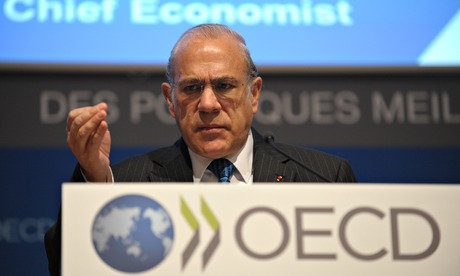The state has the powers to make business serve us better. A north London borough is leading the way

A few weeks ago, I had the disconcerting experience of sitting in a smart room full of clever people who sincerely held a silly idea. We had been gathered together by a big charity to discuss its research on inequality, and talk naturally turned to Britain’s free-market economy. Some praised the free market, others longed to reform it: all agreed it was central to the UK being one of the most unequal economies in the rich world.
The famous political philosopher worried whether the free market was eroding our ethics; the gentle wonk from a rightwing thinktank thought that tempering it would turn a dynamic economy into an arthritic one. The British people now saw themselves as free-marketeers, argued the strategist from a giant consultancy; try telling that to the Occupy protesters in Parliament Square, retorted the environmentalist at his elbow.
Economists, politicians, academics: all well read and well meaning. But what was this free market they each took for granted? It had nothing to do with the tap water in our glasses – that came from the local monopoly, Thames Water. Nor did it apply to the trains that delivered some of my fellow diners – many rail services face no direct competition.
And what about the lights and heating? Nearly three decades on from the start of liberalisation, 90% of the gas and electricity piped into our homes is still controlled by an oligopoly of six huge suppliers who contend for our custom by trying to bamboozle us with their tariffs.
Few conceits are more cherished by our political classes than the notion that this is a free-market economy. To the right it is what makes Britain great. For the left it is what they are up against. And for the rich it is what justifies their huge pay packets: after all, they have earned it.
When asked for his view of western civilisation, Gandhi said he thought it would be a very good idea. I feel much the same way about the free market: I’m genuinely curious to see what such a mythical beast looks like. But that term, however widely accepted and advertised, has little to do with today’s Britain. The economy most of us experience – everything from who collects our bins, to how we commute to work, to that new school attended by the kids – is often not a free market at all. Instead, it’s a bog of privately run monopolies; of public projects and services outsourced to businesses for years, even decades, at a time; and massive taxpayer subsidies handed to the corporate sector with fewer questions asked than of disabled people wondering where their living allowance has gone.
Grasp that, and the question of how to tame corporate power becomes easier to answer. If corporations rely on the public for a sizeable chunk of their revenues and power, then we should start asking what they are doing for us in return. Do businesses deserve the privileges given them by society?
You almost never hear this question from any politician. What you get instead is the kind of cant served up by David Cameron at last year’s Conservative conference: “It’s not the government that creates jobs. It’s businesses that get wages in people’s pockets, food on their tables, hope for their families and success for our country.”
Really? Cameron can’t be looking at the same economy as the rest of us. In Britain businesses take £85bn a year from the public in grants, subsidies, insurance schemes, preferential credit and government services. That’s the corporate welfare bill as totted up by Kevin Farnsworth, senior lecturer in social policy at the University of York, and he admits it’s on the conservative side. Add on the various subsidies for too-big-to-fail banks and you’re well in excess of a hundred billion. Nor does he include the most fundamental privilege society affords the investors in a business such as Tesco: that of limited liability, which means they only stand to lose the value of their shares, and no more. We could argue for limited liability, but let’s not pretend it’s anything less than a substantial underwriting of shareholder enterprises.
If it is business that gives, and government that takes, then how does Cameron account for privatisation and outsourcing? Take the farce that is the rail industry, where taxpayers stump up billions for the infrastructure and the upgrades, while tycoons such as Richard Branson and Brian Souter put in hardly any investment, and always have the option in hard times of walking away. That is what GNER did with the East coast mainline that the public had to step in and save – and which the government has justawarded to Branson and Souter.
The same wacky logic of low risk, low investment applies in outsourcing. G4S can’t provide the security for the Olympics, Serco can’t lay on the staff for an out-of-hours GP service in Cornwall – but never mind, both still get to bid and win more public sector work. Under this coalition the money spent on outsourcing has doubled to £88bn,creating a whole string of what Margaret Hodge at the public accounts committee calls “quasi-monopolies”.
The fashionable thing to say is that in a globalised economy states can’t keep up with businesses. That is to get the relationship the wrong way round. The reality is that states often give businesses their revenues and so their power. More than that: markets are created by states, who provide the infrastructure, the transports and the rule of law.
So let’s start asking businesses what they’ve done for us recently. If the state is going to subsidise the rail industry (and we will, until it’s eventually renationalised), ministers should insist not just on an intermittently punctual train service and a token contribution to the Treasury, but also better pay and conditions for staff, decent training, and a commitment to sourcing equipment in Britain.
This is what the Centre for Research in Socio-Cultural Change terms “social licensing” in its latest book, The End of the Experiment. The academics’ suggestions have been followed by one council in north London, Enfield. Officers and researchers sat down and worked out how much money its 300,000 residents sent the way of big businesses: 11 Tesco stores, for instance, provided the PLC with around £8m of its annual profit. And what did the area get back? Not very much, but the highlight included a community toilet scheme and some charitable giving from the supermarket’s corporate social responsibility department.
And so the council has started asking big businesses, such as utility firms, what they had done for Enfield recently. They’ve begun hassling banks to lend more to local businesses, the likes of British Gas to give more of their local work to local contractors with local staff – or run the risk of being named and shamed in the local press. It may sound small, but imagine if the same approach were taken by Holyrood or Cardiff – or by Westminster.


